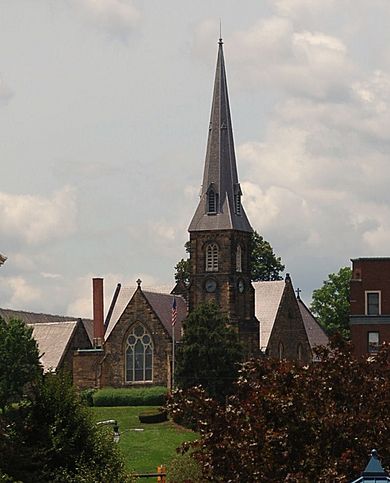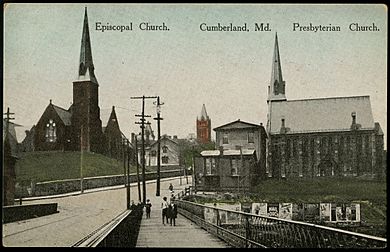Emmanuel Episcopal Church (Cumberland, Maryland) facts for kids
The Emmanuel Episcopal Church is a historic church in Cumberland, Maryland. It stands on the ground where Fort Cumberland was once located. This fort is famous because George Washington started his military career there. The fort was built in 1755, and some of its original dirt walls, called earthworks, are still underneath the church today.
The church's parish, or community, was formed in 1803. However, the church building you see today was started in 1849 and finished in 1851. It is made from a type of sandstone found in the area. Inside, you can see beautiful stained-glass windows made by the famous Tiffany company. The church also has a small model of what Fort Cumberland looked like.
A Church Built on a Fort
The Emmanuel Episcopal Church is located in the Washington Street Historic District. It is a great example of an early building style called Gothic Revival architecture. This style was popular in the 1800s and was inspired by the grand cathedrals of the Middle Ages.
The church was designed by an architect from Philadelphia named John Notman. He based his design on St. Paul's Church in Brighton, England. What makes this church extra special is that it was built right on top of the old Fort Cumberland. Tunnels from the fort still exist and run under the church.
The Fort's History
Fort Cumberland was an important outpost during the French and Indian War (1754-1763). This war was fought between Great Britain and France over land in North America. The only original building left from the fort is a small cabin. This cabin was used by George Washington as his headquarters. It has since been moved to a nearby park called Riverside Park.
The Parish House
Next to the church is the Cumberland Parish House, which was built in 1903. It was designed by Bruce Price, an architect who grew up in Cumberland. Price used a style called Second Empire for the Parish House. This style was popular at the time and was based on French architecture.
The Parish House has features like a section that sticks out from the main building, tall windows, and a high roof. Many other houses in the Washington Street Historic District look similar to the Parish House.
Visiting the Church Today
The Emmanuel Episcopal Church and Parish House are located at 16 Washington Street. They are considered important buildings in the city's historic district. The church holds services that are open to everyone.
If you want to see the old fort tunnels under the church, you can take a tour. These tours are usually available during the city's Heritage Days festival in June. The church grounds are also part of the Fort Cumberland Walking Trail. You can follow signs to learn more about the fort's history.
 | Stephanie Wilson |
 | Charles Bolden |
 | Ronald McNair |
 | Frederick D. Gregory |



